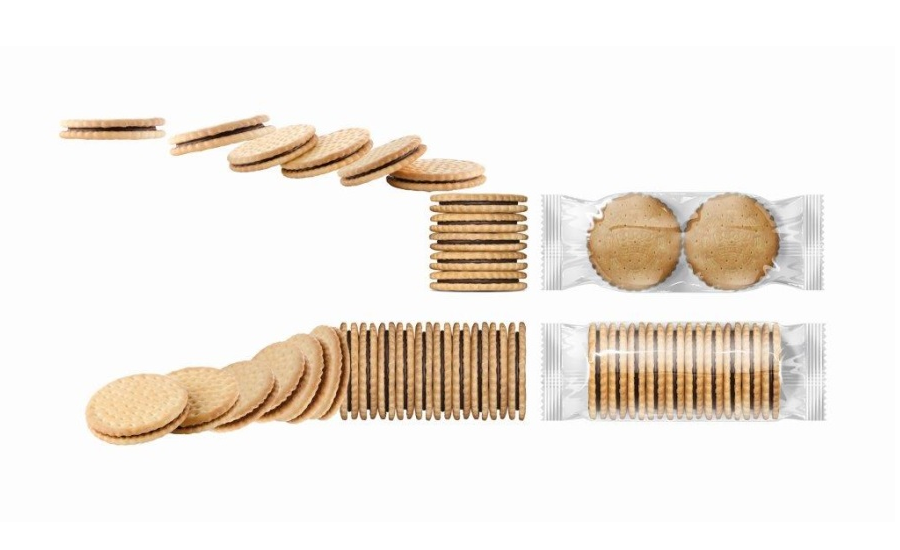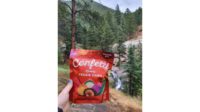You might call it a global demand for small treats. The market demand for biscuits and savory crackers is on the rise, creating opportunities for food manufacturers to develop and strengthen their brands. The global bakery industry has seen revenue rise to around $408 billion over the past five years, with the industry's contribution to the global economy projected to grow at an average annual rate of 2.6%. [1] From a packaging standpoint, the expansion in this market is boosting the demand for fully-automated systems that increase efficiency and enable more hygienic processing. In addition, the need for flexible equipment and tailored solutions, backed by expert support, will help brand managers leverage the market opportunity in baked goods and meet ever-changing and diverse consumer needs.
In North America, the commercial side of the biscuit industry is concentrated: the 50 largest bakery companies generate 75% of revenue, with the typical company operating just one facility.[2] In this tight market space, biscuit manufacturers in the region need to be able to quickly adapt to changing retailer and consumer demands to stay competitive. Investment in new, flexible and future-proof technologies is crucial for lasting commercial success.
Key mission: Automation and flexibility
For North American manufacturers, Overall Equipment Effectiveness (OEE) continues to be an important factor in purchasing decisions. Equipment must be designed to maximize space and production facilities, while achieving high quality output that meets current and future demands. A high degree of reliable and flexible packaging automation is crucial, as are easy operation and maintenance.
For a commodity like biscuits, efficient automated technologies with high capacity process lines can compensate for low profit margins. In manufacturing facilities, where space is also a premium, high-speed automated lines enable greater productivity within an overall reduced footprint. With no two manufacturers having the same needs, it’s crucial to work with a supplier capable of providing a packaging system custom-made to meet specific needs. Bosch Packaging Systems AG, a company of Bosch Packaging Technology, collaborates with customers to develop tailor-made solutions that achieve production goals and business objectives.
Labor costs in some markets have nearly doubled in the past five years, and as a general trend, salaries are rising as emerging markets become more mature. Training is another cost driver as it is difficult to find skilled personnel. As a rule, automated packaging lines need fewer operators compared to semi-automated lines. It reduces the cost of labor and allows manufacturers to redirect workers to higher-level tasks as skills become more refined. New automated lines also come with an advanced Human Machine Interface (HMI) that is easy and intuitive to use, reducing the downtime required for training. Over the past few years, Bosch Packaging Systems AG has implemented such operator-friendly technology, which helps meet growing global demand for biscuit production.
As biscuit manufacturers often need to pack different products on the same line, packaging systems must have the flexibility to handle different pack styles and configurations. Currently, 75% of biscuits are packaged in flexible packages. Typically, pile packing formats are used for packages less than 50 grams, and both pile and slug formats are used for packages between 51 grams and 100 grams. For packages over 100 grams, the vast majority are packaged into slugs.
With consumer tastes constantly changing, incorporating automated packaging technology designed for maximum flexibility is a must. It enables manufacturers to make quick and easy adjustments to respond rapidly to consumer demands. Flexible equipment lets operators rapidly modify production to suit various levels of product protection and product characteristics, such as from pile to slug packs, with little downtime. These targets are clearly achieved with the new Two-in-One Biscuit Line. For instance, packages can be produced airtight, gas proof, or with corrugated cardboard around the biscuits to prevent mechanical shocks. In addition, there is a range of sealing technologies to accommodate various film qualities. To help improve production and enhance brands, biscuit manufacturers and brand managers should take expertise and consultation into consideration when purchasing equipment to make sure that the most efficient and appropriate system is purchased.
One example of evolving consumer demand in emerging markets is the trend towards single-serve packaging. For many consumers, a single-serve option conveys product freshness since it is meant to be eaten all at once and the pack price is more affordable compared to bigger packs. Single-serve packaging also adds convenience for busy consumers, such as urban professionals or individuals seeking portion control or a snack that can be eaten on-the-go. As a result, single-serve packs are becoming a preferred format for primary packaging displays at point-of-purchase.
Focus on hygiene
Globally, concerns about food safety are rising, creating new regulations and tighter enforcement of existing guidelines. Indeed, these concerns are also affecting emerging markets, where food manufacturers look to adopt additional hygienic practices. New automated lines have been designed with stricter hygiene in mind. Some examples include steel frames and streamlined designs that prevent trapping product crumbs in holes and crevices. Automation is also inherently more hygienic than semi-automatic operations because fewer workers come into contact with food, thus reducing the potential for contamination.
Greening for the future
Food manufacturers are also exploring new “green” options to reduce waste and CO2 emissions. This includes biodegradable films and light weighting packaging by using thinner foils and fewer materials. Not only are these options more environmentally friendly, they help decrease overall costs without sacrificing quality.
Some packaging material manufacturers are also developing a new generation of multi-layer “functional” films that incorporate up to seven layers compared to the current standard of three layers. Despite the additional layers, these films are actually thinner due to new extrusion technology. This new multi-layer film technology can improve barrier properties that help protect products from ultraviolet (UV) deterioration, humidity and flavor degradation.
As food manufacturers in North America attempt to meet rising demand for biscuits of ever-changing shapes, sizes and consistencies, incorporating automated packaging technologies will be crucial for success. Above all, manufacturers need packaging suppliers who are able to act as consultants to help them find the best solution for their requirements. Bosch Packaging Systems AG brings more than 50 years of experience with biscuits packaging – expertise that manufacturers can leverage to help boost brands and seize market share.
About Bosch Packaging Technology
Based in Waiblingen near Stuttgart, Germany, and employing 5,600 associates, the Bosch Packaging Technology division is one of the leading suppliers of process and packaging technology. At over 30 locations in more than 15 countries worldwide, a highly-qualified workforce develops and produces complete solutions for the pharmaceuticals, food, and confectionery industries. These solutions are complemented by a comprehensive after-sales service portfolio. A global service and sales network provides customers with local points of contact. Additional information is available online at www.boschpackaging.com


